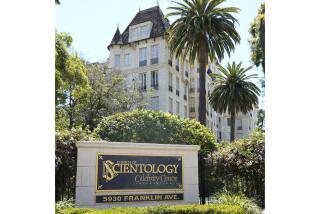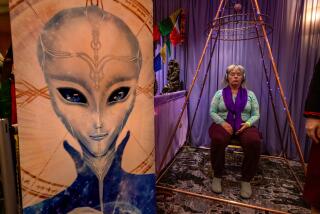Religious skeptics disagree on how aggressively to challenge the devout
As the largest organization of American atheists, agnostics and other religious skeptics gathered in Los Angeles this weekend, there was a predictable amount of scorn heaped on Christians, Jews and Muslims.
Religion was dismissed as “nonsense” and “superstition”; those who believe were described variously as “ignorant” and “stupid.”
Fellow nonbelievers were not spared, however, as lines were drawn between “new atheists,” who encourage open confrontation with the devout, and “accommodationists,” who prefer a subtler, more tactical approach.
Such a debate “would have been incomprehensible 10 years ago,” said Tom Flynn, executive director of the Council for Secular Humanism, which held its 30th anniversary meeting at the Biltmore Hotel in downtown Los Angeles. But the 9/11 attacks and a growing interest in atheism have emboldened the in-your-face wing of the movement and led to internal debate and dissension.
That rift cracked open recently when Paul Kurtz, a founder of the secular humanist movement in America, was ousted as chairman of the Center for Inquiry, a sibling organization to the Council for Secular Humanism. One factor leading to his ouster was a perception that Kurtz was “on the mellower end of the spectrum,” Flynn said.
The tension was evident at the Biltmore, where about 300 nonbelievers from across the United States and Canada gathered for three days of lively and, at times, gleefully blasphemous debate. (“I have a personal commitment to committing blasphemy every day,” biologist P.Z. Myers said.)
These are good days, generally speaking, for the nonreligious, who feel emboldened by the success of books on atheism by authors such as Christopher Hitchens, Richard Dawkins and Sam Harris. Surveys put the percentage of atheists and agnostics in the United States at anywhere from 5% to 12%, with the total of all the nonreligious at about 15%. Nonbelievers see them as potential converts.
With that background, and with the legacy of 9/11 providing impetus to those who see religious fundamentalism as a threat, there was a sense of urgency at the Biltmore conference about finding the right approach. Should nonbelievers confront the religious or try to get along?
Even “accommodationist” atheists are not known for mincing words, and although there were periodic reminders that those at the gathering shared “99% of our intellectual DNA,” as author Chris Mooney put it, the disagreements were not exactly gentle.
When Mooney, a leading voice for accommodation, said there was nothing to stop a nonreligious person from being spiritual, Myers’ reaction was nearly physical. “Whenever we start talking about spirituality,” he said, “I just want to puke.”
Mooney said nonbelievers need to pick their fights and to form alliances with religious people who share their views on particular subjects, such as the importance of stem cell research.
Among the stars of the conference were Dawkins, Harris and a third bestselling author, Victor Stenger. Stenger, a physicist, said that there was a “very real” war between science and religion and that nonbelievers would make headway only by directly challenging the devout.
Dawkins, the author of “The God Delusion,” presented the case for confrontation as one of intellectual honesty. “Part of the problem,” he said, “is that some people confuse clarity with shrillness.”
mitchell.landsberg@latimes.com
More to Read
Sign up for our Book Club newsletter
Get the latest news, events and more from the Los Angeles Times Book Club, and help us get L.A. reading and talking.
You may occasionally receive promotional content from the Los Angeles Times.







